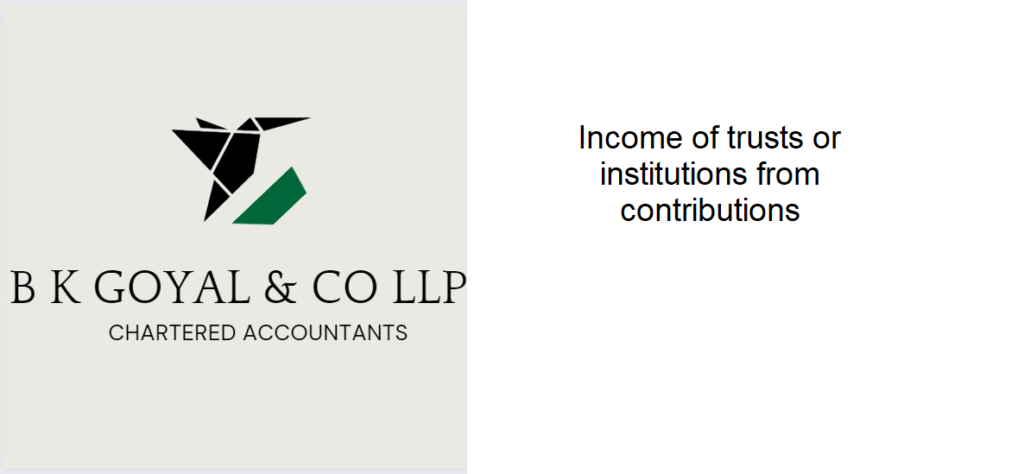Trusts and institutions are not-for-profit organizations that are established to advance a social cause or provide public benefits. Though their primary objective is not centered on generating profits, these organizations require funding to operate and accomplish their goals. Contributions from donors are a significant source of income for trusts and institutions.
Donations, grants, bequests, and gifts are some of the typical forms of contributions that trusts and institutions receive. These contributions are critical for the functioning of these organizations, as they enable them to provide valuable services to the community without the need to generate profits.
The income generated from contributions is utilized for various purposes. Firstly, it covers the administrative expenses of the organization, such as salaries, rent, and other expenses related to running the organization. This allows the trust or institution to concentrate on achieving its objectives without facing financial constraints.
Secondly, the income from contributions is used to finance the programs and services provided by the trust or institution. For example, if the organization focuses on education, the funds may be used to provide scholarships, procure educational materials, or fund research initiatives.
Finally, the income generated by trusts and institutions from contributions is used to construct and maintain the organization’s infrastructure. This includes investing in technology, equipment, and facilities, which enables the organization to provide better services to its beneficiaries.
It is noteworthy that the income generated by trusts and institutions from contributions is subject to regulations and restrictions. Many countries have laws that mandate trusts and institutions to report their income and expenditure and ensure that the funds are being utilized for the intended purposes.
Furthermore, donors may also impose restrictions on how their contributions are utilized. In such cases, the trust or institution must ensure that the funds are utilized in accordance with the donor’s wishes.
In conclusion, contributions from donors play a crucial role in enabling trusts and institutions to carry out their important work. By supporting these organizations through donations and contributions, individuals and businesses can help to create positive social change and improve the lives of those in need.
section 12 of Income Tax Act, 1961
(1) Any voluntary contributions received by a trust created wholly for charitable or religious purposes or by an institution established wholly for such purposes (not being contributions made with a specific direction that they shall form part of the corpus of the trust or institution) shall for the purposes of section 11 be deemed to be income derived from property held under trust wholly for charitable or religious purposes and the provisions of that section and section 13 shall apply accordingly.
(2) The value of any services, being medical or educational services, made available by any charitable or religious trust running a hospital or medical institution or an educational institution, to any person referred to in clause (a) or clause (b) or clause (c) or clause (cc) or clause (d) of sub-section (3) of section 13, shall be deemed to be income of such trust or institution derived from property held under trust wholly for charitable or religious purposes during the previous year in which such services are so provided and shall be chargeable to income-tax notwithstanding the provisions of sub-section (1) of section 11.
Explanation.—For the purposes of this sub-section, the expression “value” shall be the value of any benefit or facility granted or provided free of cost or at concessional rate to any person referred to in clause (a) or clause (b) or clause (c) or clause (cc) or clause (d) of sub-section (3) of section 13.
(3) Notwithstanding anything contained in section 11, any amount of donation received by the trust or institution in terms of clause (d) of sub-section (2) of section 80G in respect of which accounts of income and expenditure have not been rendered to the authority prescribed under clause (v) of sub-section (5C) of that section, in the manner specified in that clause, or which has been utilised for purposes other than providing relief to the victims of earthquake in Gujarat or which remains unutilised in terms of sub-section (5C) of section 80G and not transferred to the Prime Minister’s National Relief Fund on or before the 31st day of March, 2004 shall be deemed to be the income of the previous year and shall accordingly be charged to tax.
Services of B K Goyal & Co LLP
Income Tax Return Filing | Income Tax Appeal | Income Tax Notice | GST Registration | GST Return Filing | FSSAI Registration | Company Registration | Company Audit | Company Annual Compliance | Income Tax Audit | Nidhi Company Registration| LLP Registration | Accounting in India | NGO Registration | NGO Audit | ESG | BRSR | Private Security Agency | Udyam Registration | Trademark Registration | Copyright Registration | Patent Registration | Import Export Code | Forensic Accounting and Fraud Detection | Section 8 Company | Foreign Company | 80G and 12A Certificate | FCRA Registration |DGGI Cases | Scrutiny Cases | Income Escapement Cases | Search & Seizure | CIT Appeal | ITAT Appeal | Auditors | Internal Audit | Financial Audit | Process Audit | IEC Code | CA Certification | Income Tax Penalty Notice u/s 271(1)(c) | Income Tax Notice u/s 142(1) | Income Tax Notice u/s 144 |Income Tax Notice u/s 148 | Income Tax Demand Notice
